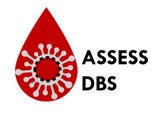This site has now been archived and content is not being updated. |
You are here
Accelerating SARS-CoV-2 SEroprevalence SurveyS Through Dried Blood Spots (ASSESS-DBS)
COVID-19 Research Area(s): Diagnostics, Genomics & Transmission Dynamics, Epidemiology & Public Health, Equipment & Technology Innovations
Phase 4 of BC’s Restart Plan requires community immunity but seroprevalence studies of people who are street entrenched, in prison, or live in remote or rural communities is challenging. The most accurate serology tests are lab-based Enzyme-Linked Immuno Assays (EIAs) that use blood drawn from veins, but with people who are not engaged into care, or who have collapsed veins due injection drug use or obesity, it's not a viable option. Point-of-care tests (PoCT) that use blood collected through finger prick (like a glucose test) seems to offer a solution but these tests lack specificity and therefore can’t provide an accurate picture. We propose evaluating dried blood spots (DBS), as these seem to offer the accuracy of EIAs and the ease of collection of a PoCT to determine BC seroprevalence.
ASSESS-DBS is a cross-sectional study to investigate the seroprevalence of SARS-CoV-2 antibodies among people who are incarcerated in British Columbia (BC) Provincial Correctional Centres, as well as staff that work in these facilities. This will be achieved by collecting paired Dried Blood Spot (‘DBS’) and venous blood samples from 1000 voluntary participants recruited from across all 10 BC Provincial Correctional Centres. Additional specimens will be collected from anyone with COVID-19 symptoms, consistent with standard of care in BC. As such, ASSESS-DBS will also aim to determine prevalence of active SARS-CoV-2 infections among study participants, and evaluate whether Dried Blood Spots (‘DBS’) are as effective for SARS-CoV-2 sero-prevalence estimates as standard venepuncture specimens, what the acceptability of DBS among people in BC Provincial Corrections is, and what the preferences of people who are incarcerated are for blood specimen collection.
